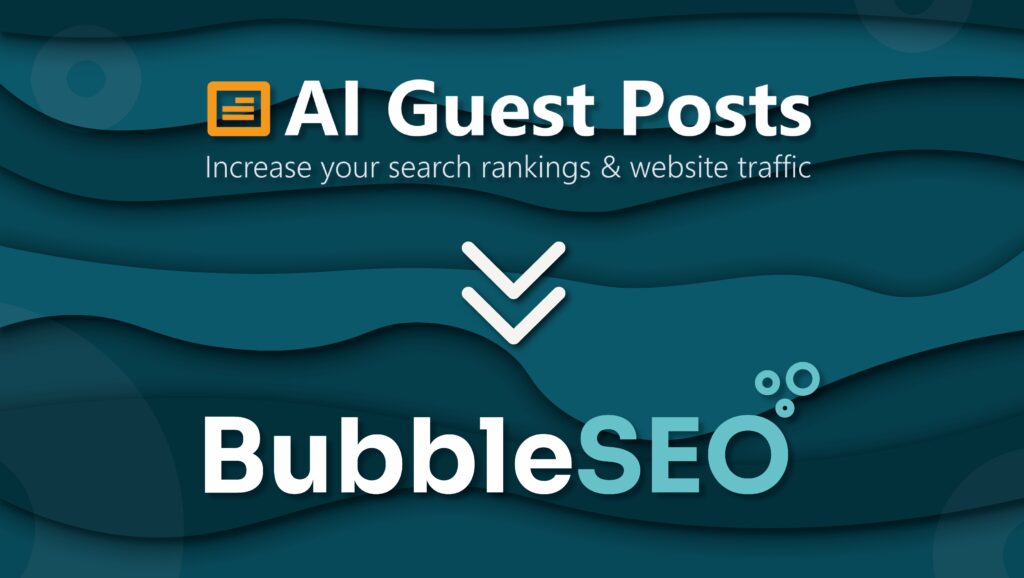
Backlinks are links are an important factor in SEO as they are a sign of credibility and relevance.

Domain Authority is a score developed by Moz that predicts search engine rankings.

Domain Authority (DA) is a search engine ranking score developed by Moz that predicts how well a website will rank on search engine results pages (SERPs). The score is based on several factors, including the quality and quantity of inbound links pointing to the website.
In guest posting, DA is important because it helps determine the quality and authority of a website that accepts guest posts. Websites with a high DA are generally considered more authoritative and trustworthy by search engines, which can help improve the visibility and ranking of the guest post.
When you publish a guest post on a website with a high DA, you are essentially getting a backlink from a reputable source, which can improve your own website’s DA and overall search engine ranking. However, it’s important to note that DA is just one of many factors that search engines use to rank websites, and guest posting on low-quality websites with high DA can actually hurt your SEO efforts. It is best to use platforms, like BubbleSEO which have a range of domains to choose from, and you can choose which domain and DA is the best for you to publish on.
DOs:
DON’Ts:
Overall, when it comes to guest posting, it’s important to focus on publishing high-quality content on reputable websites with high DA to get the most benefit for your SEO efforts.
Grow your business online with content marketing solutions from Bubble SEO today.
Place An Order
Search Engine Optimisation (SEO) is often viewed as a complex and ever-changing field, but its core principles remain constant. If you're looking to increase your website's visibility, generate traffic, and climb the search engine ranks, understanding the foundational elements of SEO is critical. This article will unlock the secrets of SEO, covering essential topics like link building, content marketing, and optimising for search engine rankings. 1. The Foundation of SEO: Why It Matters At its core, SEO is about making your website more visible to search engines like Google, Bing, or Yahoo. The higher your site ranks on search engine results pages (SERPs), the more likely users are to visit your site. Why does this matter? Studies show that over 75% of users never scroll past the first page of search results, making it crucial to rank as high as possible. 2. The Power of Content Marketing Content marketing is a central part of any successful SEO strategy. Search engines prioritise websites that regularly publish high-quality, relevant content. This not only helps with ranking but also establishes your brand as an authority in your industry. Focus on High-Quality Content: Google’s algorithms reward websites that produce in-depth, well-researched content. Blogs, case studies, infographics, and videos that provide real value to your audience are more likely to rank well. Consistency is Key: Regularly updating your website with fresh content signals to search engines that your site is active and valuable. Use Targeted Keywords: When creating content, make sure to incorporate keywords that your audience is searching for. Tools like SEMrush or Google Keyword Planner can help identify relevant keywords with high search volume. 3. Link Building: The Backbone of SEO Link building is one of the most important ranking factors for search engines. It involves getting other reputable websites to link back to your content, signaling to search engines that your site is authoritative and trustworthy. Earn Quality Backlinks: Focus on earning backlinks from credible, high-authority sites within your industry. Guest posting on blogs, securing mentions in industry publications, and creating shareable resources are great ways to attract backlinks. Avoid Low-Quality Links: Links from spammy or irrelevant sites can harm your rankings. Always aim for quality over quantity when building links. Internal Linking: Don’t overlook the power of internal links. By linking to other relevant pages on your website, you improve your site’s structure, making it easier for both users and search engines to navigate. 4. On-Page SEO: Optimising Each Page On-page SEO involves optimising individual pages on your site to help search engines understand and rank your content. Title Tags and Meta Descriptions: Your title tag is one of the first things search engines and users see. Make sure your primary keyword is included. Meta descriptions, while not a direct ranking factor, improve click-through rates when they are engaging and relevant. Headers (H1, H2, H3): Break your content into readable sections using headers, which help both users and search engines digest the material. Image Optimisation: Use descriptive alt text for images and compress them to ensure your page loads quickly, another critical ranking factor. 5. Technical SEO: Enhancing Site Performance Beyond content and links, technical SEO is crucial for ensuring your site is easy to crawl, secure, and optimised for all devices. Mobile Optimisation: As more users search on mobile devices, Google now considers mobile-friendliness a key ranking factor. Use responsive design to ensure your site looks great and functions well on mobile. Site Speed: Slow-loading sites frustrate users and are penalised by search engines. Tools like Google PageSpeed Insights can help you improve load times. Crawlability and Indexing: Make sure your site is easy for search engines to crawl and index. Submit an XML sitemap to Google Search Console, and fix any errors that may block search engines from accessing your content. 6. Search Engine Ranks: Climbing the SERPs The ultimate goal of SEO is to rise to the top of search engine ranks. But getting there takes time, effort, and the right strategy. Track Your Progress: Use tools like Google Analytics, Moz, or Ahrefs to monitor your search rankings and track organic traffic over time. This will help you identify what’s working and what needs improvement. Competitor Analysis: Regularly check in on your competitors to see how they’re performing in search results. Understanding their strategies can reveal opportunities for your own SEO improvement. Continuous Optimisation: SEO isn’t a one-time task—it requires regular adjustments. Keep up with the latest trends and algorithm updates to ensure your site remains optimised for long-term success. 7. The Future of SEO SEO is always evolving, and staying ahead of the curve is crucial for maintaining your search rankings. With the rise of artificial intelligence, voice search, and new ranking factors like Core Web Vitals, it’s more important than ever to stay informed about SEO developments. Focus on user experience, creating valuable content, and building authoritative links to future-proof your SEO strategy. Conclusion SEO doesn’t have to be a mystery. By focusing on key areas like content marketing, link building, and technical SEO, you can unlock the secrets to improving your search engine rankings. SEO is a long-term investment, but with a clear strategy and consistent effort, you’ll start seeing the rewards in higher rankings, increased traffic, and greater visibility for your brand. Master the essentials of SEO today and watch your website soar to new heights!

Would you like to write the most engaging and gripping content? As the internet grows, it seems so does the amount of competition. We are all looking for ways to stand out from the rest of the internet and grab the attention of our desired audience. Although it is not the easiest task to achieve great, quality content, it will be the best way to grab the right attention! With the growth of the internet and accessible online sources, this can be used to our advantage and help find ways to use and implement features into own our content. Quality is not about how many posts are shared, but the characteristics and style of your content.

Improving your SEO profile through backlinks is a crucial aspect of a successful SEO content strategy. Backlinks are one of the most powerful tools in SEO.

Having a well-crafted website is essential for any business, big or small. For small businesses, particularly your website acts as your digital storefront, helping you attract and engage potential customers. But creating content that speaks to your audience while also supporting your business goals? That’s where many business owners struggle. To make things easier, we’ve put together 10 practical tips to help you write website content that’s engaging, clear, and optimised to drive results. 1. Understand Your Audience Before you start writing, take a step back and think about who you’re speaking to. Your website content should be tailored to your ideal customer—what they need, what challenges they face, and how your business can help. Consider asking yourself: Who is my ideal customer? What problems are they looking to solve? What kind of language or tone resonates with them? Once you have these insights, your content will feel more natural, relatable, and persuasive. 2. Keep It Clear & Simple People visit websites for quick, useful information—not lengthy, complicated text. Use straightforward language and break up content into easily digestible sections. Some best practices include: Writing short, easy-to-read sentences Using clear headings and subheadings Incorporating bullet points or numbered lists to highlight key points If someone lands on your site, they should understand what you offer and how it benefits them within seconds. 3. Use a Conversational Tone Small businesses thrive on personal connections, so your website content should reflect that. Instead of formal, robotic language, aim for a warm, engaging tone that makes visitors feel welcome. For example, instead of: “Our services aim to improve business operations.” Try: “We’re here to help you run your business more efficiently so you can focus on what you do best.” A friendly, approachable tone makes your brand feel more human. 4. Focus on Benefits, Not Just Features Customers don’t just want to know what you offer—they want to know why it matters to them. Instead of simply listing features, highlight the benefits. Example: Feature: “We offer next-day delivery.” Benefit: “Get your order delivered fast, so you can start using it right away!” By shifting the focus to how your product or service solves a problem, you’ll create more compelling content. 5. Optimise for SEO Without Overdoing It Search Engine Optimisation (SEO) helps your website rank higher on Google, making it easier for potential customers to find you. However, stuffing your content with keywords can make it sound unnatural. Instead, focus on: Naturally incorporating relevant keywords into your titles, headings, and first 100 words Writing compelling meta descriptions Using alt text for images Adding internal and external links where appropriate A well-planned SEO content strategy ensures your website reaches the right audience while maintaining readability. Many businesses also invest in SEO content services to improve their rankings and attract organic traffic. For expert guidance, check out Moz’s SEO Beginner’s Guide. 6. Include Strong Calls to Action (CTAs) Your website should guide visitors toward a specific action—whether it’s making a purchase, booking a consultation, or signing up for a newsletter. Examples of strong CTAs: “Get your free quote today!” “Sign up now for exclusive offers!” “Book a call with us—we’d love to chat!” Make sure your CTAs are clear, compelling, and easy to find. For more guidance on effective CTAs, visit HubSpot’s CTA Best Practices. 7. Share Your Brand Story People love stories, and sharing yours helps build trust with your audience. Whether it’s how your business started, what you stand for, or the passion behind what you do—your brand story can make you more relatable and memorable. For example, instead of just saying, “We sell handmade candles,” you could share: “We started our candle-making journey in a small kitchen, inspired by a love for natural scents and eco-friendly products. Today, we hand-pour each candle with care, ensuring a toxin-free experience for our customers.” This personal touch can make all the difference in building customer loyalty. 8. Craft Compelling Headlines Your headlines should immediately capture attention and encourage visitors to keep reading. To make your headlines stand out: Keep them clear and concise Highlight the benefit to the reader Use engaging words like “easy,” “ultimate,” “best,” or “proven” For example: “The Ultimate Guide to Growing Your Small Business” “Get Fast, Reliable Shipping—Order Today & Save 20%!” A strong headline can make the difference between a visitor staying or clicking away. Need help crafting attention-grabbing headlines? Check out Copyblogger’s Guide to Writing Headlines. 9. Leverage Social Proof People trust recommendations more than advertisements. Incorporating social proof—like customer testimonials, reviews, or case studies—can help build credibility. Ways to showcase social proof: Highlight positive customer testimonials Share success stories and case studies Display logos of trusted partners or media mentions When potential customers see that others have had a great experience with your business, they’ll feel more confident in choosing you. For more on how social proof influences conversions, read Neil Patel’s Guide to Social Proof. 10. Keep Your Content Fresh & Updated A website with outdated information can hurt your credibility. Regularly updating your content ensures that visitors always find relevant, up-to-date information. Make it a habit to: Refresh old blog posts with new insights Update product descriptions and service offerings Remove outdated information Not only does this keep visitors engaged, but it also signals to search engines that your site is active, which can boost your rankings. A well-maintained content marketing strategy includes regular updates, ensuring your site remains competitive in search results. Many small businesses turn to content marketing services for expert guidance on keeping their website relevant and engaging. For additional insights, check out Content Marketing Institute’s Strategy Guide. Final Thoughts Great website content isn’t just about filling up pages with words—it’s about crafting a message that resonates with your audience, builds trust, and drives action. By keeping things clear, conversational, and customer-focused, you can turn your website into a powerful tool for business growth. Keep refining your content, test what works best, and always prioritise providing value. If you're looking for expert support, investing in SEO content and content marketing services can help you develop a strong SEO content strategy that boosts traffic and conversions. Now it’s time to put these tips into action—happy writing!

In the world of content marketing, one of the most powerful yet underutilised tools is the topical map. As SEO becomes more complex, building topical authority is essential for boosting rankings, user engagement, and overall content visibility. A topical map serves as a blueprint that guides content creation, allowing marketers to strategically cover every aspect of a subject to establish authority. In this post, we’ll explore what topical maps are, their main benefits, and how they can transform your content strategy. What is a Topical Map? A topical map is a visual representation of the relationships between different topics and subtopics within a specific content domain. Think of it as a web that connects everything you want to cover about a particular subject. For example, if your central topic is "Digital Marketing," a topical map would include interconnected branches to related subtopics such as "SEO," "Content Marketing," "Social Media," and "PPC." Each of these subtopics would also be broken down further into related concepts, creating a comprehensive framework for content creation. The image below provides an example of what a topical map might look like for the subject of Digital Marketing: The Benefits of Using Topical Maps in Content Strategy 1. Improved Topical Authority and SEO Performance One of the key advantages of using a topical map is that it helps build topical authority, which is crucial for SEO success. Search engines like Google have become increasingly sophisticated in understanding context and relationships between topics. By creating content that thoroughly covers a particular subject through interconnected subtopics, your website signals to Google that it is a credible source of information. This boosts your visibility in search engine results. Topical maps ensure that your content strategy is holistic, covering all relevant angles of a subject, which increases your chances of ranking for a wider array of keywords. For more details on how topical authority impacts SEO, check out this insightful article from Search Engine Journal. 2. Comprehensive Content Planning Creating a topical map makes content planning easier and more strategic. Instead of randomly generating blog posts or articles, you use the topical map to determine exactly what pieces are needed to fully cover a topic. This allows you to fill content gaps, address different user intents, and establish a clear publishing schedule. Using a tool like SEMrush can help you identify the key topics and subtopics that are relevant to your niche, ensuring that your content map is comprehensive. This approach keeps your content organised, reduces redundancy, and provides a clear roadmap for content teams. 3. Enhanced User Experience Topical maps also improve the user experience by allowing visitors to easily navigate through your content. When users land on your website looking for specific information, they are likely to explore related content if it's well linked and logically structured. By interlinking articles that cover different aspects of a subject, you create a seamless content journey that keeps users on your site for longer, reducing bounce rates and increasing engagement. By leveraging structured content interlinking, your users will appreciate the in-depth information provided, enhancing their trust in your brand. For tips on how interlinking can boost SEO and user engagement, refer to this guide by Moz. 4. Maximising Content Relevance and Covering Search Intent A topical map helps ensure that you are covering search intent for every stage of the buyer's journey. Whether users are looking for basic information, in-depth guides, or comparisons, your content needs to be relevant to what they are searching for. By mapping out various content types—from educational blog posts to product guides—you ensure that your website caters to all stages of the customer journey. This comprehensive coverage improves the likelihood that users will find exactly what they need, ultimately boosting conversions and building brand authority. For a deeper understanding of search intent and how to create content that addresses it, take a look at Ahrefs’ guide to search intent. The Role of Keyword Clustering in Topical Maps Keyword clustering is an essential component of building topical maps, as it ensures that related keywords are grouped together to effectively cover each subtopic. Instead of creating isolated content pieces targeting single keywords, keyword clustering helps you create pillar and cluster content that addresses multiple related search terms. How Keyword Clustering Boosts SEO Broader Coverage of Search TermsBy clustering related keywords, you improve your chances of ranking for a range of similar queries. For instance, instead of focusing solely on "content marketing strategies," you can create a cluster that also targets keywords like "content marketing plan," "content strategy examples," and "how to create content for marketing." This broader coverage signals to search engines that your content is thorough and relevant to the entire topic. Improved Content RelevanceWhen you target multiple related keywords within a topic, you enhance the relevance of your content to users and search engines. Using keyword clustering, you create a more interconnected content strategy that aligns with Google's goal of providing comprehensive answers. Tools like Keyword Insights can help you identify keyword clusters based on user intent, ensuring that your content aligns perfectly with what users are searching for. Reduced Keyword CannibalisationKeyword clustering also helps prevent keyword cannibalisation, where multiple pages on your website compete for the same search term. By grouping related keywords and assigning them to a specific piece of content, you avoid this issue and ensure that each page has its own distinct focus. How to Create a Topical Map for Your Content Strategy Building a topical map is a step-by-step process that involves careful research and planning. Here’s a short guide to help you get started: Step 1: Choose Your Main Topic Identify the core topic you want to build authority on. This should be relevant to your industry and of interest to your target audience. For instance, if you’re in the digital marketing space, your core topic could be “SEO Strategies for 2024.” Step 2: Research Subtopics Use keyword research tools such as SEMrush or Ahrefs to identify the most important subtopics related to your main topic. These could include elements like "On-Page SEO," "Technical SEO," "Link Building Strategies," etc. Step 3: Cluster Keywords Group related keywords into clusters based on their relevance to each subtopic. This will help you determine which keywords to target within each piece of content, ensuring you cover all relevant aspects comprehensively. Step 4: Create Pillar and Cluster Content Use the topical map and keyword clusters to create a pillar page—a long, comprehensive piece of content that covers your niche in depth. Develop cluster topics or subtopics that provide detailed information on specific aspects of the main topic. Ensure that all related content is well interlinked. Step 5: Review and Update Regularly Your topical map should not be static. As your industry evolves, update your map to cover new topics, trends, or changes in search intent. Keeping your content fresh and relevant will continue to boost your authority. Conclusion: Harness the Power of Topical Maps and Keyword Clustering Incorporating topical maps and keyword clustering into your content strategy is an effective way to build topical authority, enhance user experience, and boost your overall SEO performance. By providing comprehensive coverage of a subject and strategically creating clusters of supporting topics, you establish yourself as an expert, which in turn improves trust and visibility in search engine results. Start creating your topical map and clustering keywords today to take your content strategy to the next level, and make sure to keep evolving your approach as new trends and topics emerge.

Effective keyword targeting is the cornerstone of successful content marketing. By strategically incorporating the right keywords, you can enhance your SEO, drive traffic, and improve your overall content performance.

Content marketing is the creation of information and content and how this can be shared across different formats

We're excited to announce that AI Guest Posts has undergone a transformative rebranding and is now known as Bubble SEO. This strategic move has allowed the business to develop within the digital landscape and highlight our commitment to providing digital marketing solutions tailored to enhance online visibility and engagement for our customers. Bubble SEO remains dedicated to delivering high-quality, targeted content and effective SEO solutions that align with evolving digital marketing trends. Here is a little more information about our brand and its services. Our services: At Bubble SEO, we specialise in three core services, with content writing being a new feature to the website: Guest Posting: Which aims to enhance your online presence with high-quality guest posts on authoritative websites, driving traffic and boosting your SEO rankings. Link Building: Helps build a robust backlink profile with strategic link building services that improve your website's authority and visibility. Content Writing: Provides engaging content for your audience with compelling content tailored to your brand voice and SEO needs. Benefits of Bubble SEO: We have now made changes to the booking process to simplify this, and updated the customer dashboard section in the hope to improve our existing values below: Enhanced Service Quality: With our rebranding comes a renewed focus on delivering top-notch services that exceed your expectations. Improved User Experience: Our new website offers a streamlined interface, making it easier for you to navigate and access our services. Expanded Network: Benefit from our expanded network of partner websites, ensuring broader outreach and better opportunities for your business. Loyalty Rewards: As a token of our appreciation for the continued support of our bookers, we have now introduced loyalty rewards: Exclusive Discounts: Enjoy special discounts as a loyal Bubble SEO customer, with the more points you acquire, the more exciting offers you will unlock. We're thrilled about this new chapter as Bubble SEO and look forward to continuing to be your trusted partner in achieving your digital marketing goals. Stay tuned for more exciting updates and announcements! Discover the new Bubble SEO and elevate your online presence today! Jennifer Hobson – Digital Marketing [email protected] Heather Ryan – Business Development [email protected]